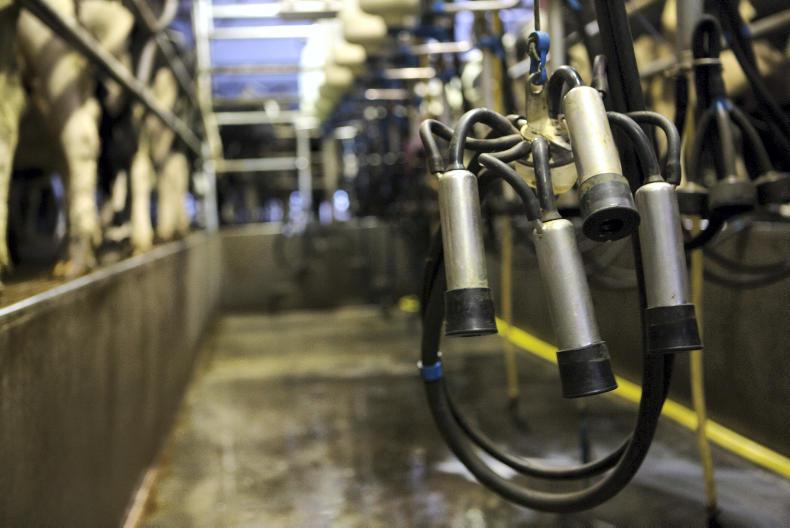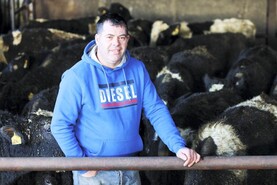The number of new entrants to the dairy sector from other enterprises has increased significantly over the last few years. As the number of dairy farmers and, in particular, new entrants grows around the country, Teagasc has announced plans to implement an accredited course for new entrants into the industry.
The Teagasc Dairy Start-Up is an accredited Level 6 course that will begin in September 2018 and run over a period of five days. It was established in response to the growing demand for a programme dedicated to new dairy entrants into the market.
While courses such as this ran from 2009 to 2012, an accredited course has not run since then.
The programme will run in Teagasc educational centres around the country. However, the educational body states that a minimum number of participants must apply in each centre to ensure the course is viable. Should the nearest centre an applicant applies to not run the course due to a lack of numbers, they may be offered the closest available centre, according to Teagasc.
The list of venues proposed to host the courses are:
• Thurles.• Enniscorthy.• Portlaoise.• Fermoy (Moorepark).• Pallaskenry.• Tullamore.• Tuam.• Ballina.• Ballymote.• Mullinavat.About the course
This course is designed to help an individual decide whether dairy farming is right for them, while also establishing what the likely costs and returns from dairy farming would be on their farm. The course will be practical and interesting, according to Teagasc, mixing both the principles for successful dairying with the practical skills required for the start-up process.
In summary, the purpose of this course is to “equip the learner with the knowledge, skills and competence to effectively plan and carry out a successful dairy start-up”.
Course structure
The course will be offered in two parts. The first part is a series of five training days, comprising four days in autumn 2018, followed by a final day in late 2019.
The majority of the first two days are spent in a local Teagasc office or training centre, learning about the principals of milk production, an overview of the industry, business planning and grazing management, and infrastructure.
The afternoon of the second day will be spent on a local farm, where participants can see first-hand the infrastructure put in place by an efficient dairy farmer.
The third day of the course will be spent on either Greenfield Farm in Kilkenny or Shinagh dairy farm in Bandon, Co Cork, or another local recently converted dairy farm where students can get an overview of the farm, including layout, costs, paddock infrastructure, breed of cow, etc.
The location students will be sent depends in which centre they are studying the course.
The fourth day will take place at the AGRI Centre in Moorepark, Co Cork. This will go over topics such as milk quality, milking machines and designs, grassland cultivars and animal health.
Between the initial four days and the final day, participants will have an opportunity to participate in an academy, where the group will meet monthly from February to November (10 meetings) for one year.
In order for participants to complete the course, they must complete five mini projects, ideally over the course of the four days.
Each day will run from 10am to 4.30pm, with one hour for lunch, comprising, in all, of five and half hours’ contact time.
The meetings
In addition to the five training days (27.5 hours contact), participants will meet on 10 occasions between day four and day five. Each meeting will be two hours in duration (total 20 hours). While the main focus of these meetings will be grassland management (including soil fertility, reseeding, grassland measurement, grassland management decisions), the following topics will be incorporated into individual meetings:
• Health and safety, including farmer wellbeing.• Profit monitor.• Tactical planning – reacting to day-to-day challenges.• Nutrient management planning/fertiliser planning.• Winter feed budgeting.The module specification for this course is “planning and managing farm expansion”. As already mentioned, the completion of the course will lead to a Level 6 QQI approved certificate.
Speaking with Irish Country Living, Tom O’Dwyer, head of dairy knowledge transfer in Teagasc, said that the course would be significantly beneficial to those who are taking the big step in converting their enterprise to dairy.
“The decision for a farmer to convert their enterprise to dairy is a significant decision and, in most cases, it means a large capital investment. Teagasc can provide good independent science-based advice to help you with that decision,” he explains.
Course benefits
On completion of the course, participants will have gained valuable knowledge and skills to assist with the establishment of a successful dairy farm.
To apply
Places are limited, so early booking is advised. You can reserve a place on one of the courses by registering on the Teagasc website at www.teagasc.ie, or calling your nearest participating Teagasc centre.
Costs
The cost of the course is €750 (€600 for Teagasc clients) per participant. CL
The number of new entrants to the dairy sector from other enterprises has increased significantly over the last few years. As the number of dairy farmers and, in particular, new entrants grows around the country, Teagasc has announced plans to implement an accredited course for new entrants into the industry.
The Teagasc Dairy Start-Up is an accredited Level 6 course that will begin in September 2018 and run over a period of five days. It was established in response to the growing demand for a programme dedicated to new dairy entrants into the market.
While courses such as this ran from 2009 to 2012, an accredited course has not run since then.
The programme will run in Teagasc educational centres around the country. However, the educational body states that a minimum number of participants must apply in each centre to ensure the course is viable. Should the nearest centre an applicant applies to not run the course due to a lack of numbers, they may be offered the closest available centre, according to Teagasc.
The list of venues proposed to host the courses are:
• Thurles.• Enniscorthy.• Portlaoise.• Fermoy (Moorepark).• Pallaskenry.• Tullamore.• Tuam.• Ballina.• Ballymote.• Mullinavat.About the course
This course is designed to help an individual decide whether dairy farming is right for them, while also establishing what the likely costs and returns from dairy farming would be on their farm. The course will be practical and interesting, according to Teagasc, mixing both the principles for successful dairying with the practical skills required for the start-up process.
In summary, the purpose of this course is to “equip the learner with the knowledge, skills and competence to effectively plan and carry out a successful dairy start-up”.
Course structure
The course will be offered in two parts. The first part is a series of five training days, comprising four days in autumn 2018, followed by a final day in late 2019.
The majority of the first two days are spent in a local Teagasc office or training centre, learning about the principals of milk production, an overview of the industry, business planning and grazing management, and infrastructure.
The afternoon of the second day will be spent on a local farm, where participants can see first-hand the infrastructure put in place by an efficient dairy farmer.
The third day of the course will be spent on either Greenfield Farm in Kilkenny or Shinagh dairy farm in Bandon, Co Cork, or another local recently converted dairy farm where students can get an overview of the farm, including layout, costs, paddock infrastructure, breed of cow, etc.
The location students will be sent depends in which centre they are studying the course.
The fourth day will take place at the AGRI Centre in Moorepark, Co Cork. This will go over topics such as milk quality, milking machines and designs, grassland cultivars and animal health.
Between the initial four days and the final day, participants will have an opportunity to participate in an academy, where the group will meet monthly from February to November (10 meetings) for one year.
In order for participants to complete the course, they must complete five mini projects, ideally over the course of the four days.
Each day will run from 10am to 4.30pm, with one hour for lunch, comprising, in all, of five and half hours’ contact time.
The meetings
In addition to the five training days (27.5 hours contact), participants will meet on 10 occasions between day four and day five. Each meeting will be two hours in duration (total 20 hours). While the main focus of these meetings will be grassland management (including soil fertility, reseeding, grassland measurement, grassland management decisions), the following topics will be incorporated into individual meetings:
• Health and safety, including farmer wellbeing.• Profit monitor.• Tactical planning – reacting to day-to-day challenges.• Nutrient management planning/fertiliser planning.• Winter feed budgeting.The module specification for this course is “planning and managing farm expansion”. As already mentioned, the completion of the course will lead to a Level 6 QQI approved certificate.
Speaking with Irish Country Living, Tom O’Dwyer, head of dairy knowledge transfer in Teagasc, said that the course would be significantly beneficial to those who are taking the big step in converting their enterprise to dairy.
“The decision for a farmer to convert their enterprise to dairy is a significant decision and, in most cases, it means a large capital investment. Teagasc can provide good independent science-based advice to help you with that decision,” he explains.
Course benefits
On completion of the course, participants will have gained valuable knowledge and skills to assist with the establishment of a successful dairy farm.
To apply
Places are limited, so early booking is advised. You can reserve a place on one of the courses by registering on the Teagasc website at www.teagasc.ie, or calling your nearest participating Teagasc centre.
Costs
The cost of the course is €750 (€600 for Teagasc clients) per participant. CL






 This is a subscriber-only article
This is a subscriber-only article









SHARING OPTIONS: